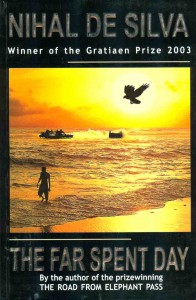 Nihal DeSilva was a formidable novelist, a master of plot and character development who was killed by a landmine while in his mid-50s, only three books into a literary career that promised to propel him into the firament of notable writers of political intrigue. The Far-Spent Day (2004, ISBN 978-955-8095-74-4), like his previous book, the Gratiaen Prize-winning The Road from Elephant Pass, won the prestigious, evidences wonderful character development and a compelling plot.
Nihal DeSilva was a formidable novelist, a master of plot and character development who was killed by a landmine while in his mid-50s, only three books into a literary career that promised to propel him into the firament of notable writers of political intrigue. The Far-Spent Day (2004, ISBN 978-955-8095-74-4), like his previous book, the Gratiaen Prize-winning The Road from Elephant Pass, won the prestigious, evidences wonderful character development and a compelling plot.
The Far-Spent Day is the story of a small Sri Lankan shopkeeper who runs afoul of “influential people” running the political system in Sri Lanka. Along the way, he picks up the alliance of a female reporter. As the tale unfolds, they are clearly in over their heads, as they encounter all sorts of miseries, from murder to child prostitution. The bad guys here aren’t playing around, which is why, we suppose, we couldn’t put the book down. Precipitous plots twists are the name of the game here, and they occur on virtually every page. And although the story resolves well, it doesn’t necessarily end in the manner that the reader may wish. For a novel, it’s a great dose of reality.
Along the way, we’re treated to the work of DeSilva the wordsmith, who infuses the book with his superb writing on nature whenever he can:
They followed the gravel road as it swung across a small bridge and then continued in an easterly direction beyond the Research Station. The thick canopy of the forest stretched across the road in its quest for sunlight and gave them some respite from the early afternoon sun. This was an area that had been selectively logged when a brain dead government had given a Canadian company permission to extract timber for supply to a local plywood factory, A storm of public protests had halted the project but the affected areas had produced a regenerated forest, slightly different in character to the virgin rain forest.
On account of the thinner vegetation, it was easier to spot birds there. That’s where they ran into a feeding flock. The forest that seemed to be dozing quietly in the mid-afternoon heat suddenly burst into life. A feeding flock of birds is a unique feature of the Sinharaja Flocks of birds, many different species, were moving through the forest in an orderly way, feeding noisily as they went.
Ravi tried co identity them. Orange-billed Babblers were in mid canopy, chirping lustily. He saw Black Bulbuls, Yellow-naped Woodpeckers, an Azure Flycatcher and a couple of Crested Drongos flitting about. A Laughing Thrush was rooting in the leaf mould on the forest floor. Then he caught a, glimpse of the rare and wonderful Red-faced Malkoha in the upper canopy.
Ravi explained how the flocks fed at different levels of the forest, and helped each other. The birds feeding on the forest floor picked up any succulent tit-bit that was dislodged by the birds feeding above them. Insects the ground feeders disturbed when they foraged on the forest floor were picked up by the birds feeding in the trees above.
The Drongos were warrior-bandits. Two or three of these jet-black •ds kept watch, faithfully guarding the feeding flock against predators. But the feeders had to pay a price. If one of them unearthed a particularly succulent grub or moth, one of the Drongos would execute a power dive to snatch it away from the finder. Species by species, the birds crossed the road over their heads and moved away into the forest, their incessant twittering gradually fading away. Then the forest was quiet again, except for the droning of the Cicadas.
The book takes place in Sri Lanka, but it’s not really about Sri Lanka. Instead, it reveals a tale that can be told on a daily basis in virtually any country in Asia, where there’s very little black and white in terms of truth, but rather a series of grays. The book will appeal to old and new Asia hands, and everyone just loving a great, fast-paced story. It’s also a bittersweet reminder of the fleeting nature of human life, in this particular case, of a writer taken away from us before he had fully finished his fourth (and final) novel. The book is a sobering reminder of what great writer he was, and how much he left unfinished in his career as an author. Buy it here at the WoWasis eStore.
Leave a Reply